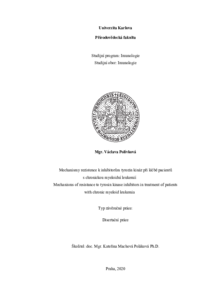Mechanismy rezistence k inhibitorům tyrozin kináz při léčbě pacientů s chronickou myeloidní leukemií
Mechanisms of resistance to tyrosin kinase inhibitors in treatment of patients with chronic myeloid leukemia
dizertační práce (OBHÁJENO)

Zobrazit/
Trvalý odkaz
http://hdl.handle.net/20.500.11956/125269Identifikátory
SIS: 113249
Kolekce
- Kvalifikační práce [21515]
Autor
Vedoucí práce
Oponent práce
Zuna, Jan
Bělohlávková, Petra
Fakulta / součást
Přírodovědecká fakulta
Obor
Imunologie
Katedra / ústav / klinika
Katedra buněčné biologie
Datum obhajoby
20. 4. 2021
Nakladatel
Univerzita Karlova, Přírodovědecká fakultaJazyk
Čeština
Známka
Prospěl/a
Mechanismy rezistence k inhibitorům tyrozin kináz při léčbě pacientů s chronickou myeloidní leukemií Zavedení léčby inhibitory tyrozin kináz (TKI) znamenalo průlom v léčbě pacientů s chronickou myeloidní leukemií (CML). I přes velkou úspěšnost této terapie se u 20 až 30 % pacientů rozvíjí rezistence k této léčbě. Cílem této práce bylo za využití in vitro CML modelu sledovat mechanismy související s rozvojem mutací v kinázové doméně (KD) BCR-ABL1 a případně jiných genech, které jsou zodpovědné za rezistenci k TKI. Dále byl sledován vliv střídavé terapie interferonem alfa (IFN-α) a TKI na zastoupení klonů s multirezistentní mutací a role aktivace imunitního systému v dosažení léčebných odpovědí na tomto typu léčby. Jako poslední byla studována možnost využití měření exprese transportérů hOCT1 a ABCB1 v době určení diagnózy u pacientů s CML jako prediktivního markeru odpovědi na léčbu imatinibem. Buňky CML buněčné linie KCL-22 jsou po vystavení účinku imatinibu schopny opakovaně vyvíjet mutace v KD BCR-ABL1. Na klonech odvozených od kultury KCL-22 jsme prokázali existenci de novo mutageneze. U čtyř klonů KCL-22, které byly schopny proliferovat v prostředí s 4µM imatinibem, došlo k vývoji mutací v KD BCR-ABL1, nebo KRAS. Vývoj mutací byl asociován se změnou exprese genů účastnících se odpovědi buněk na...
Mechanisms of resistance to tyrosin kinase inhibitors in treatment of patients with chronic myeloid leukemia The introduction of tyrosine kinase inhibitor (TKI) therapy represented a breakthrough in the treatment of patients with chronic myeloid leukemia (CML). Despite a high success rate of the TKI therapy, 20-30 % of patients develop resistance to the treatment. The aim of this work was to study the mechanisms, related to the mutation development in BCR-ABL1 kinase domain (KD) or in the other genes responsible for TKI resistance, using the in vitro CML models. Furthermore, the effect of interferon alpha (IFN-α) and TKI sequential therapy on the presence of clones with multidrug-resistant mutations and a role of activation the immune response in achieving the treatment response were followed. Lastly, we studied the possibility of using the measurement of gene expression of hOCT1 and ABCB1 transporters at the time of diagnosis in CML patients as a predictive marker of the imatinib treatment response. KCL-22 CML cell line cells exposed to imatinib were repeatedly able to develop BCR-ABL1 kinase domain mutations. We demonstrated the existence of de novo mutagenesis in clones derived from the KCL-22 cell line. In four clones, which can proliferate in 4µM imatinib, mutations in BCR-ABL1 KD or KRAS were...
